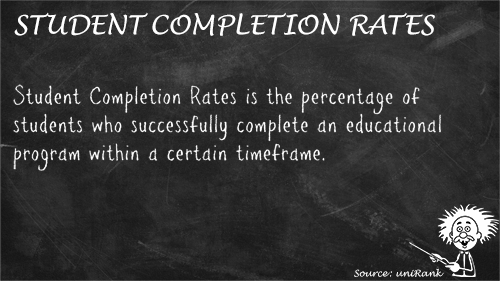
Student Completion Rates
What does the academic term Student Completion Rates mean in higher education?
Student Completion Rates

Short Definition
Student Completion Rates is the percentage of students who successfully complete an educational program within a certain timeframe.
In-depth Overview
Student Completion Rates
Long definition: Student Completion Rates refer to the percentage of students who successfully finish a specific academic program, course or degree within a defined period. These rates are an essential metric used in higher education to assess the effectiveness of educational programs, measure student success and evaluate an institution's ability to support students in achieving their educational goals. Completion rates are often calculated by comparing the number of students who graduate or complete a program with the total number of students who initially enrolled or started.
Etymology: The term completion has its roots in Latin, with "completio", which means "a finishing". In an educational context, it signifies the successful conclusion of a program or course.
Synonyms or related academic terms:
- Graduation Rates
- Success Rates
- Completion Percentages
Examples of Use:
- The student completion rates for the engineering program have increased significantly over the past five years.
- Understanding graduation rates is crucial for assessing the quality of higher education institutions.
- Improving success rates is a priority for universities aiming to enhance student outcomes.
Translations:
Spanish: Tasas de Finalización de Estudiantes
French: Taux de Réussite des Étudiants
German: Studienabschlussquoten
Italian: Tassi di Completamento degli Studenti
Portuguese: Taxas de Conclusão de Estudantes
Japanese: 学生の修了率 (Gakusei no Shūryōritsu)
Chinese (Simplified): 学生完成率 (Xuéshēng Wánchéng Lǜ)
Hindi: छात्र पूर्णता दरें (Chhatra Pūrṇatā Dareṁ)
Visitors can search for this term through the uniRank World Universities Search Engine.
unirank Glossary Classification
Miscellaneous higher education terms > University academic terms
Share Glossary Term
Interesting? Share this University Glossary term with your friends now.